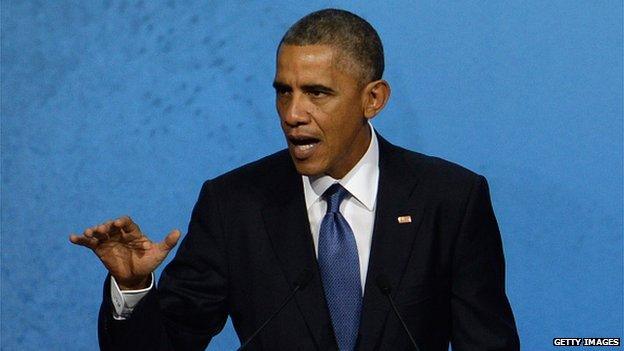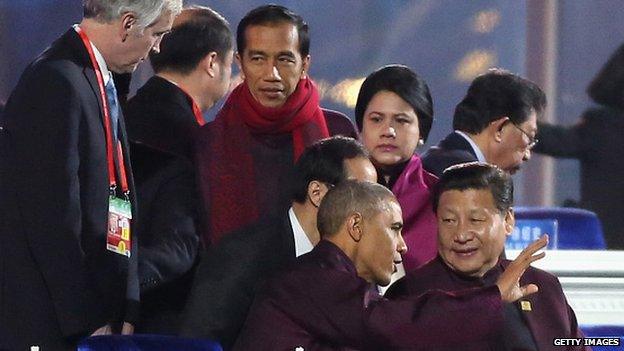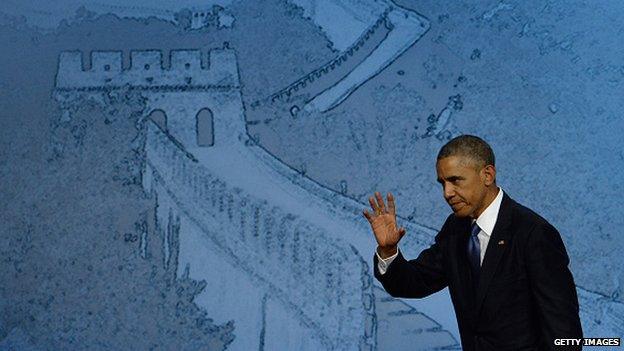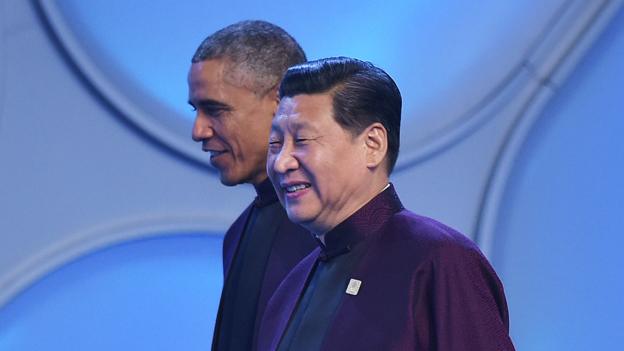Obama pushes for a 'legacy' trade deal in Asia
- Published

Obama says he and other world leaders are making "good progress" towards a trade deal
Victorious Republicans are making President Barack Obama's life miserable, but there's one bright spot - now he has a better chance to break through "log jams" on a trade deal with Asian leaders.
On Wednesday Obama is planning to meet with China's president, Xi Jinping, in the Great Hall of the People.
It is a dramatic backdrop for one of Mr Obama's meetings during his visit to Asia, a trip that marks significant momentum in efforts to reach a trade agreement known as the Trans-Pacific Partnership.
Chinese leaders are not part of the negotiations over the trade deal, but nevertheless they are an important part of the bigger picture.
Negotiations over the Trans-Pacific Partnership involve 12 countries. They make up about 40% of global GDP and one-third of world trade, according to a Brookings Institution report, external.
The Trans-Pacific Partnership is a work-in-progress - of monumental proportions.
"It's much more than a trade agreement," says Bernard Gordon, author of America's Trade Follies and professor emeritus at University of New Hampshire. "It will help improve overall rules for commerce."
The agreement, he explains, will set standards for patents, copyrights, intellectual property and other aspects of commerce.
Dan Steinbock, a director with the US-based India China and America Institute, an advocacy organisation, says: "It's really an effort to create a massive free-trade zone."
Working towards the agreement is an integral part of Mr Obama's so-called "pivot" towards Asia.

Mr Obama has been talking with China's president, Xi Jinping, about US-China relations
Many people in Washington say the pivot has been side-tracked by events in the Middle East, Russia and other regions - and that it has produced little results. Indeed White House officials have changed their approach, speaking now about a "rebalancing" in Asia, rather than a pivot.
Still some things have changed, despite scepticism about achievements of the Obama White House. (One analyst, Ely Ratner, even wrote a Foreign Policy piece, external that is called: "The False Cry of the Pivot Deniers".)
At least by his own account Mr Obama made "good progress" during negotiations over the Trans-Pacific Partnership with leaders from other nations.
"Today is an opportunity, at the political level, to break some of the remaining log jams," he said after their meetings on Monday.
Discussing the negotiations over the Trans-Pacific Partnership, US Trade Representative Michael Froman said: "All the countries are very focused."
This weekend in Brisbane, say White House officials, Mr Obama will give an important speech about US policy in Asia. He's likely to again bring up the Trans-Pacific Partnership.
It's a subject he'll almost certainly discuss with US lawmakers in the fall and several weeks later when Republicans control both chambers of Congress.
As it happens, this is one area where Mr Obama and Republicans in Congress have found common ground.
In contrast, many Democrats have baulked at Obama's efforts to work towards the trade deal.
"There is a general scepticism about free trade," says Steinbock, recalling massive protests against global trade in Seattle in the 1990s. "I don't think this has disappeared."
Partly for this reason, many members of Congress have made things harder for Mr Obama. They have, for instance, not wanted him to wield authority to "fast-track" negotiations with foreign leaders. This has slowed down his progress towards the trade deal.
Republicans, however, are more receptive to the idea.
Senator Orrin Hatch, a Republican from Utah, has written an op-ed, external in favour of the deal, describing it as an "opportunity".
Other Republicans have also shown support. Some of them welcome the trade deal because they believe it could at some point act as a way to impose stricter controls on China.
China is not currently part of the negotiations over the agreement. The agreement has requirements, such as environmental and free-market standards, that China fails to meet.
Still their presence is felt during the negotiations.


Behind two trade deals
Trans-Pacific Partnership
12 countries
Backed by US, includes Japan, excludes China and Russia
Could account for more than a third of world economic output
Free Trade Area of the Asia-Pacific
Longer-term project, first proposed in 2004
Backed by China, includes major economies
China says would provide greater economic boost than TPP

Obama and other White House officials take the long view.
Susan Rice, the national security adviser, explained in a speech, external in Washington last year she and other officials hope China will become part of the agreement - at least down the road.
In China, though, many people resent the negotiations and are suspicious of the Trans-Pacific Partnership. They worry the US is trying to exert their power in the world and to minimise the role of China.
Steinbock says: "This has been seen as part of the American policy of quote-unquote 'containment.'"
As a result some leaders in Asia have agreed to embark on a study of another free-trade agreement known as the Free Trade Area of the Asia-Pacific. It's less stringent than Trans-Pacific Partnership, the one backed by US officials.
However one looks at the the negotiations, though, there's no doubt the talks will have significant implications for Mr Obama, as well as for others in the US and around the world.
Steinbock says: "The trade deal is vital to the Obama legacy."
Follow Tara McKelvey, external on Twitter.
- Published11 November 2014
- Published11 November 2014
